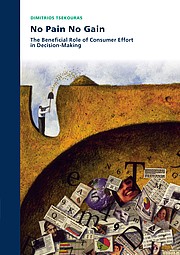No Pain No Gain: The Beneficial Role of Consumer Effort in Decision-Making Defended on Tuesday, 13 November 2012
The overarching goal of this dissertation is to study the role of consumer effort within the context of online decision making. We show that consumer effort may not be necessarily malevolent and that some sources and measures of greater consumer effort can lead to beneficial outcomes. A better understanding of the role of consumer effort may help firms to evaluate their investments in reducing consumer effort and justify the cost associated with implementing such strategies. First, we suggest that user effort reduction can be beneficial when it concerns the size of the content of the information but not when it regards the involvement of users in the process of getting the information. These opposing effects can be attributed to the mediating role of content learning. Second, we use the complexity of the composition of the recommended choice set as a source of consumer effort and we propose that greater complexity (through increasing consumer effort) increases objective consumer knowledge due to greater required cognitive elaboration but decreases choice confidence and subjective product knowledge. We validate that these effects on product knowledge are managerially meaningful due to their positive effect on website conversion and consumer willingness to pay. In the third study, we examine the role of time as a measure of consumer effort in the context of online product recommendations. We distinguish between consumer inspection time-based effort at the choice set and at the product-level and suggest that whereas in the first case, inspection time decreases website conversion, at the product level, greater inspection time has the opposite effect due to the different antecedents. Accordingly we suggest improvements on the composition of the recommended choice sets in a way that the allocation of consumers’ time spent is effectively balanced.
Keywords
decision making, consumer behavior, consumer effort, learning, choice complexity, time spent, recommendations, website conversion, website evaluation











